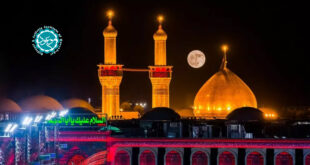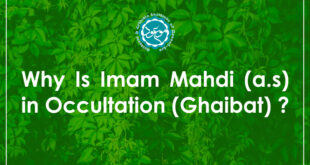The above points, as well as some other tens, point put the importance of Ghadir, and introduce Ali, (peace be upon him) as the ‘Imam’ and the right proxy of the Messenger of Allah.
VI– Since the beginning of the Ghadir, the Muslims and even the non-Muslims have considered the historical event of Ghadir, and the ‘Divine Leadership, and the proxy pick as, ‘the chief religious event’. They have commented on it in different books – it has been put in historical books. As the narration, they have brought it in the story books; and in dictionaries, by means of it, they have explained the words and phrases and the words meanings in it. It has come to use in the commentaries concerning the revelation of the Verses, and at last, from the point of Ghadir, it has been transcribed in the books of literatures. Now, as you notice, by the historians are:
Blazary: in Ansab Alashraf, (demised 279)
Ibn Ghatibeh: in Almaarif, and Imamat and Alseiaseh, (demised 276)
Tabari: in a separate book about Ghadir Khom, (demised 310)
Khatib Baghdadi: in his own history, (demised 463)
From the Narrations:
Mohammad Ibn Idris Shafeae: quoted from Nehayeh Ibn Athir, (demised 204)
Ahmad Hanbal: in Masnad and Managhib, (demised 241)
Ibn Majeh: in Sunan, (demised 273)
Termizi: in Sahih, (demised 276)
From the Commentators:
Tabari: in his Commentary, (demised 310)
Tha’labi: in his Commentary, (demised 427-37)
Wahedi: in Asbab An-Nozol, (demised 468)
Fakhr Razi: in his commentary, (demised 606)
The Orators:
Ghazi Abobar Baghlani Basari: in Al-Mottahed, (demised 403)
Ghazi Abdor Rahman Ijea Shafeae: in Mawagheb, (demised 756)
Sharif Jorjani: in Sharh Al-Mawagheb, (demised 816)
Ghoushchi: in Sharh Tajrid, (demised 879)
And from the Philologists:
Khom, Ghadir, Wali and …
Ibn Darid: in Jomhareh, volume 1/71, (321)
Ibn Athir: in An Nahayeh, (1)
Al Ghadir volume 1/ 6-8
As you see, these documents prove that the question of ‘Divine Leadership’ is not merely a historical event.
VII – Answering to a question:
Question: If the event of Ghadir is a bone of contention between the Shiites and Sunnis, then why the Sunnis do not accept the Leadership and the Guardianship of Ali, (peace be upon him) only?
Answer: We too unanimously question the Sunnis why, after seeing so many proofs about the ‘Leadership’ of Ali, (peace be upon him), they still do not give up and accept the fact! Why do they not refer to their conscience and take the straight path and then surrender to Allah?
2- Such questions as: ‘Why, with so many proofs, non-Muslims did not believe in the truth of Islam; and why the faith-rejecters, after seeing so many proofs, rejected the Creator of the worlds?’ were still existed before the ‘Leadership’.
The answer to this question is: a man can be so engaged in selfishness, prejudice and in many inwardly blind states that he easily ignores noticing the facts. In this way, he follows the bygones and by observing his passion, he takes the track to nowhere.
Off course, it is not so simple to accept the fact, and in practice, it is harder to give an undertaking to that, and being bound to the righteousness, especially when accepting the fact, one should leave many of the attachments he already had.
3- Those who, because of the eminence of the sermon of Ghadir, have not been able to reject its main sense, as: “One to whom I am Master, so is Ali his Master”, have translated the phrase in such a way that to suit their taste. That is, they have changed the Arabic letter ‘Y’ in the main text, which is ‘Master’, to mean something as, ‘Friend’.
Their next question is: “Was the sermon of Ghadir a short speech or a long and detailed one?
Answer: What have the Sunnis frequently put in their books are two: one is the main Ghadir sermon, and another one short and brief, which the lengthiest of them is put in (Al-Ghadir: Volume 1 page 10-11) by the great scholar, Amini.
And also in most Sunnis tales and traditions we see that the Holy Prophet (peace be upon him and his descendants) has delivered a lecture ‘in Ghadir’ thus, it must be discussed in details.
1- Zeid ibn Argham says, the Messenger of Allah made a speech on the Day of Ghadir Khom and said: “One to whom I am Master, so is Ali his Master”. (The History of Damascus: volume 42/ 217- Narration 8707, and The Islam History (Khalaf Era: 632 and the history of Damascus volume 2/41 – Narration 541).
2- Hazifeh bin Asid says: Indeed the Messenger of Allah delivered a speech under the (shadows) of the trees on the Day of Ghadir Khom and said, … (Kanz al-Aamal: 1/188 Narration 958 and Al-Bayan and Nehayeh Volume 7/362 the events of year 40).
3- Umar Bin Zimarr and Zeid Bin Argham says: On the day of Ghadir Khom, the Messenger of Allah made a speech: … (Al-Majan Kabir volume 5 Narration 5059, narrated from Noor Al-Amir 16-17).
We see, in the forgoing narrations, as well as hundreds alike – which now we overlook them for keeping it brief; they have quoted this sentence, ‘And the Holy Prophet lecture us’, and some similar ones, which all of them have mentioned ‘lecture’ in them, and begun with the praise of Allah. They all need explanations and they cannot be short narrations, especially in such a condition and exceptional introduction.
VIII- In justifying the Ghadir narration, another question rises: Why the Commander of the faithful, Ali, (peace be upon him), has not deduced on Ghadir Sermon to defend his right?
Answer: Ali, the Excellency, time and again, in objecting the seizure of the ‘Leadership’ unlawfully has referred to this sermon and deduced thus: which in brief, we point to some of them:
(Al-Ghadir: volume 1/ 159 onward).
1- Ali, (peace be upon him)’s own saying on the Council Day, Migration Year 23: Abul Talib Amer ibn Aelah says, “On the Day of Council, I was with Ali, (peace be upon him) by the gate of the house, when I heard that he asked the people there: “For Allah’s sake, is there anyone among you prior to me in praying the Unity of Allah?” They answered, ‘Not at all, by Allah.’ He added, ‘By Allah’s sake, tell me, is there anyone among you to whom the Prophet of Allah would ay this clause as he told me, “One to whom I am Master, so is Ali his Master”? They answered, ‘By Allah, never’.
2- During the ruler of Qthman, Saleem Tabaee said:
During the rule of Othman, I was in the Mosque of the Messenger of Allah, when I heard a discussion was going on concerning knowledge and chastity. The discussion lead to the priority of Ghoraish, until when Holy Prophet (peace be upon him and his descendants) said: ‘Imams are of Ghoraish. There were about two hundred people present, and Ali, Ibn Abi Talib (peace be upon him) was among them, and Saad Bin Waghghas, Abdor Rahman Aof Talhe and Zobeir, Meghdad, Hashem Bin Bin Atabeh, Bin Umar, Hasan, Hosein Bin Abbas, Muhammad Bin Abi Bakr …
Othman was at home then, and he was unaware of the discussion, and the Commander of the faithful, Ali and his household were sitting quite in peace. The people turned to Ali, (peace be upon him) and said, “Why do you not say a word, Ali?” It was then the Excellency answered: “Prophet (peace be upon him and his descendants) made me stand up on the Day of Ghadir Khom and he read this sermon, ‘One to whom I am Master, so is Ali his Master’, (Al-Ghadir: volume 1/ 165).
3- The logic of Ali, the Commander of the faithful, on the Day of Rohbah, in the year 35, when the Excellency understood that Prophet (peace be upon him and his descendants) is, about his privilege to the rest, under questioning, (in a big gathering), he quoted the story of Ghadir that we clearly notice it in the most authentic Al-Ghadir.
 Mouood Mouood English Edition
Mouood Mouood English Edition




